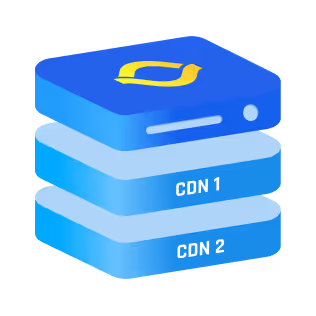Think of those moments when you're stuck in a slow-moving jam, watching the clock as precious minutes tick away. Frustrating, isn't it? This is the experience of using the internet without TCP Acceleration. When data travels across networks, it can sometimes feel like being stuck in that sluggish traffic, especially when you're eagerly waiting for information or content to load.
TCP Acceleration is an express lane on that congested highway. It's a technology designed to make the flow of your internet traffic smoother and faster, much like how an express lane keeps cars moving swiftly.
What is TCP Acceleration?
Transmission Control Protocol (TCP) addresses the inherent limitations of the standard TCP. Under typical circumstances, TCP manages data transfer by adjusting its speed based on network conditions, a process known as congestion control.
However, while this cautious approach is reliable, it often leads to slower data transmission, especially over long distances. TCP Acceleration intervenes here, employing various techniques to quicken this process, boosting its performance without changing the core mechanics.
This technology proves especially beneficial in scenarios where every millisecond counts, such as high-frequency trading, real-time data analytics, and live streaming services.
{{cool-component}}
Principles of TCP Acceleration
The core objective is to improve throughput without modifying the end-user applications. To achieve this, TCP Acceleration employs the following methods to boost internet speed:
Checksum Offloading
- This technique transfers the responsibility of calculating IP, TCP, and UDP checksums from the CPU to the Network Interface Card (NIC).
- By offloading these calculations, the CPU is freed up to manage more connections, enhancing overall system performance.
TCP Chimney Offload
- Developed through a collaboration between Microsoft and Alacritech, TCP chimney offload delegates the task of data transmission and reception for established TCP connections to the offload device.
- This shift reduces the CPU's workload, allowing it to focus on other critical tasks, thus enhancing system efficiency.
Large Receive Offload (LRO)
- LRO increases inbound network throughput by aggregating multiple incoming packets into a larger buffer, reducing the number of packets that need to be processed.
- It significantly reduces CPU overhead, especially effective in high-bandwidth network scenarios.
Large Send Offload (LSO)
- Also known as TCP Segmentation Offload, LSO involves passing a large buffer of data to the NIC, which then segments it into smaller packets.
- This process lightens the CPU's load, akin to automating part of a production line for greater output efficiency.
Benefits of TCP Acceleration
TCP Acceleration offers several streamlined benefits, enhancing network performance and efficiency in various key areas:
- Accelerates data transmission, crucial for real-time applications like video conferencing and online gaming. This results in faster communication and a smoother user experience.
- Significantly lowers delay in data transfer, vital for time-sensitive applications such as VoIP services and stock trading, enhancing responsiveness and user interaction.
- Optimizes network utilization, allowing for better handling of high data volumes without substantial infrastructure upgrades. This is particularly beneficial for data centers and large enterprise networks, where efficient data handling is critical.
- Ensures more consistent and error-free data delivery, non-negotiable for business-critical applications where data integrity is paramount.
- By offloading processing tasks from the CPU to network hardware, it reduces CPU workload, freeing up system resources for other tasks and improving overall system performance.
- Leads to economic benefits by maximizing existing network infrastructure, potentially delaying expensive upgrades. Lower CPU utilization also contributes to reduced energy consumption, offering both economic and environmental advantages.
TCP Acceleration also plays a role in reducing CDN latency. By optimizing data transmission, it ensures faster and more efficient delivery of content from CDN servers to users.
Conclusion
In essence, whether it's for business, entertainment, or communication, TCP Acceleration ensures that our digital journeys are as smooth and efficient as possible, turning the once-frustrating waits into seamless and rapid exchanges of information.



.png)
.png)
.png)






